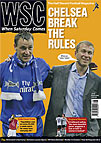 Ian Plenderleith finds a Bob Paisley site that eloquently describes one legend’s achievements and a Brian Clough site that allows another to speak for himself. But the managers of today have a poor spokesman
Ian Plenderleith finds a Bob Paisley site that eloquently describes one legend’s achievements and a Brian Clough site that allows another to speak for himself. But the managers of today have a poor spokesman
In Germany, the man named as a club’s manager actually manages a team, while the coach is the coach. In the UK, it’s the manager who coaches, while the coach nods and hands out the training bibs. The traditional workplace definition of “manager” as a dour, incommunicative bloke with no personality doesn’t apply to domestic football (Kenny Dalglish aside), which makes it surprising that there are thousands of sites devoted to players, but very few to managers.
XThere’s a decent tribute site to Liverpool legend Bob Paisley, from the makers of lfcbootroom.net, covering his playing and managerial career while offering well crafted, qualified eulogies of the low-key boss. “He never dazzled or sparkled like a Venables, never dressed like an Atkinson, didn’t pour forth his politics à la Clough, nor did he covet column inches on the front pages of the tabloids in preference to the back,” says the website of Paisley. “But in the world of sport, and in football in particular, it is a rare person indeed who achieves immortality without some obvious penchant for bluster or self-promotion.X
Although the match reports of Liverpool’s finest hours under Paisley barely recreate the excitement of winning European Cups, there are some nice details. “Bob Paisley didn’t touch a drop of alcohol all night,” it writes about the aftermath of the 3-1 win over Borussia Mönchengladbach that made the Reds European champions in 1977, “wishing to be able to remember every single moment of the party.”
It’s doubtful whether the same could have been said for the above-mentioned Brian Clough, an entirely different kind of managing animal. At Brian Clough – A Football Genius, you are immediately drawn to the quotes section. Some of them reveal his small-minded prejudices about Italian and French players, but the bibulous Clough was at his best when talking about himself.
“I wouldn’t say I was the best manager in the business,” he reportedly once said. “But I was in the top one.” Those latter-day managers said to have “lost control of the dressing room” might want to pin this one, on dealing with argumentative players, to their office walls: “We talk about it for 20 minutes and then decide that I was right.”
The site is much thinner than Paisley’s on career details, but there are interesting interviews with playwright Stephen Lowe and director Alan Dossor, the men behind a recent stage production, The Spirit of the Man [see Sidelines] which portrays Clough returning as a ghost to help a struggling writer with a drama about Robin Hood.
Going to the homepage of the League Managers Association is like opening up an obscure trade magazine aimed at carpentry equipment manufacturers or forklift truck drivers. You get the feeling you’re intruding on an enclosed world, feeding on information only intended for its target audience. “Scott is confirmed as Hartlepool manager” reads a headline. “Davies to stay at Deepdale” reads the next. “Burley resigns from Derby County” adds a third. This is the website for managers. It’s manage, manage, manage, and no play, sunshine, because you don’t get to the top of the game by bunking off.
The LMA’s chief executive, the former Wolves and Northampton boss John Barnwell, does provide some unwitting entertainment thanks to his stiff rhetoric downplaying the antics of his volatile members. When Fulham manager Chris Coleman had to be restrained from attacking match officials after a game against Middlesbrough, Barnwell was sure that “common sense” would prevail to stop any disciplinary action. “As long as the manager has not transgressed totally the regulations then I don’t see a problem,” said Barnwell. “The game had finished, Coleman had time to collect his thoughts, he corrected himself and the people got around him [and] ushered him away.”
Barnwell was just as equable about “an incident” involving Sheffield United manager Neil Warnock during a game against Derby County. “Neil was very unhappy with a tackle on one of his players by an opponent,” observes the placid executive. “We have subsequently raised this matter on his behalf, with the appropriate football bodies, and are awaiting a response.” So where actual managers are too psycho to drone on in management-speak, Barnwell intervenes with the necessary bland language and everyone has time to “correct themselves”.
Nice work, John. Thank goodness we now have someone to manage the managers.
From WSC 222 August 2005. What was happening this month